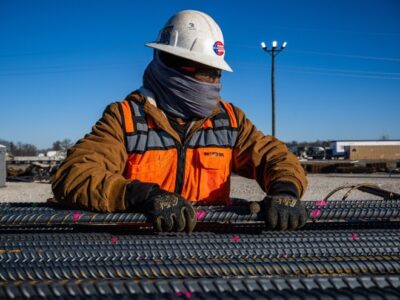(Bloomberg) —
America’s Frontier Fund, an unusual endeavor to support technology breakthroughs that it deems to be in the national interest, has made its first startup investments through a new venture capital firm.
Backed by marquee tech names like Peter Thiel, Eric Schmidt and Sam Palmisano, the organization bills itself as the first nonprofit investment platform dedicated to boosting US innovation and manufacturing. The group will focus on science at the edge of what’s currently possible — a category sometimes called “deep tech” — with a focus on fields like artificial intelligence, chips and quantum science. The group, AFF for short, aims to boost technologies that will solidify America’s geopolitical position both economically and militarily.
On Tuesday, AFF will announce its debut investments through its Albuquerque, New Mexico-based VC firm, Roadrunner Venture Studios. The cash will come from Frontier Fund I LP, a for-profit fund that has raised $100 million from the state of New Mexico. The target for the fund is $500 million, according to public filings.
The money won’t come from AFF’s high-profile donors, like Thiel and Schmidt, who have invested only in the nonprofit think tank side of the operation, a spokesman said. The nonprofit will sponsor VC firms as part of its broader mission to boost tech innovation in the US, alongside other efforts to raise the profile and funding for certain strategic industries.
Adam Hammer, a co-founder of Roadrunner, said he and his team are looking for disruptive research, often within national labs like those in Los Alamos and Sandia, and have reviewed more than 350 technologies so far. “Our mandate is to create breakthrough companies,” said Hammer, who also previously served as managing director of Schmidt Futures, an initiative created by Schmidt to support scientists and entrepreneurs, and led its geopolitical initiatives.
Roadrunner has made three initial investments: Hydrosonics, a clean technology startup focused on hydrogen production; Inaedis, a biotech company focused on cold-chain logistics of vaccine delivery; and Fab.AI, an AI company for manufacturing.
Fab.AI is building what it says is the first large language model for manufacturers and product designers, hoping to boost the efficiency of US industries. Large language models are massive data systems that serve as the building blocks for AI products like OpenAI’s ChatGPT. “The capability for advanced manufacturing has rapidly shifted from a ‘nice to have,’ to a national defense ‘need to have,’” Fab.AI Chief Executive Officer Michael Howard said in an email. In areas like chip manufacturing, “the gap between Congressional goals and the on-the-ground reality is cavernous,” he said.
Fab.AI aims to bolster a more reliable domestic manufacturing base, and one that’s more responsive to military needs and new techniques. The company will target companies that make products for the aerospace, energy, health care and medical industries.
“We will increase the efficacy of these processes to enable those suppliers to better serve in our nation’s defense,” Howard said.
So far, AFF has had a relatively quiet launch, despite the backing from billionaire investor Thiel, former Google Chief Executive Officer Schmidt and the former International Business Machines Corp. chief Palmisano, as well as the Legendary Entertainment founder Thomas Tull. Palmisano also chairs the AFF’s board, which includes former US National Security Advisor H.R. McMaster and former US Central Intelligence Agency official Joanne Isham.
AFF’s CEO is another well-known name in tech circles: Gilman Louie, the former head of In-Q-Tel, a venture fund backed by the CIA. In-Q-Tel provides early backing to startups making products that could be used by US intelligence agencies, a portfolio that includes Thiel-founded Palantir Technologies Inc. and Keyhole, which was later acquired by Google and helped create Google Earth. Louie, also a former member of the National Security Commission on Artificial Intelligence, said AFF will use its insights and warchest to accelerate innovation in nascent technologies that could help America maintain an economic and strategic edge in the coming decades.
The effort is in keeping with a larger patriotic push in Silicon Valley — one that sometimes dovetails with a drive to win a larger chunk of federal spending for startups. Venture capital firm Andreessen Horowitz said it would dedicate $500 million to investments that will bolster what it’s called American Dynamism. Since the outbreak of wars in Israel and Ukraine, and the technological advancement of China, many in the industry have pointed to tech as the best way to make the US more secure.
Not everyone has cheered for growing closeness between the tech industry and the government. The specter of an increasingly powerful private industry has worried some observers. And both Thiel and Schmidt have attracted scrutiny for their influence in Washington. But Louie and others from Silicon Valley argue that economic might, manufacturing capacity and advances in technologies like AI will prevent the US from being disastrously overtaken by more nimble geopolitical powers.
Hammer said while his team remains focused on helping its first startups reach milestones, it’s continuing to explore new deals. A few of his targets are rapid prototyping, CIS Lunar satellites and next generation hyperspectral imaging.
AFF will also expand its investment network. Roadrunner Venture Studios is its first VC firm, and is designed to eventually be a hub for a national network of venture studios. Louie said that as the group expands it will aim to target regions rich in talent but largely overlooked by coastal VCs.
“The discussions are strategic because it’s not just how you deploy dollars,” Louie told Bloomberg in an interview. “You have to move the needle.”
To contact the author of this story:
Lizette Chapman in San Francisco at lchapman19@bloomberg.net
© 2024 Bloomberg L.P.





